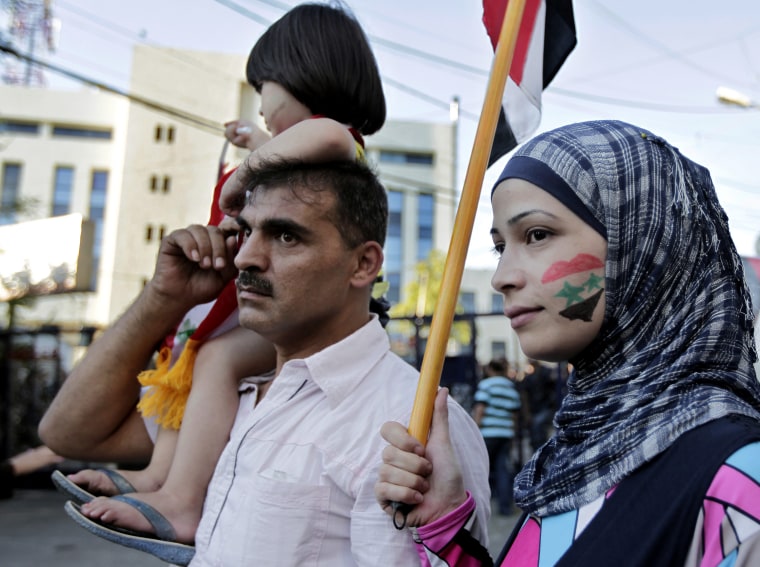While acknowledging the evidence that Syria’s regime mounted a chemical attack on its own people, the European Union Saturday said it would not take military action in the region before United Nations inspectors submit a preliminary report on the attack.
EU officials announced their decision after meeting in Lithuania with U.S. Secretary of State John Kerry, who is working to gin up international support for launching strikes on Syria.
The senior foreign policy official to the EU, Catherine Ashton, strongly condemned the Aug. 21 chemical attack near Damascus, Syria, that killed more than 1,400 people as a “blatant violation of international law, a war crime and a crime against humanity.” She said member states believe Syrian President Bashar al-Assad was behind the attack on his own people, and that it was crucial for the international community to take punitive action against the Assad regime.
However the scope of action the EU is willing to take relies heavily on the UN process, she said. The international community is awaiting the results of a UN investigation into the chemical attacks to determine whether the Security Council will approve intervention in Syria. Though Ashton pointedly did not say the EU would await UN approval before potentially taking up military action, she did endorse French President François Hollande’s refusal to act before the preliminary report was released.
Ashton emphasized the urgent need for diplomacy through political settlements and providing aid. “Only a political solution can end this terrible bloodshed, grave violation of human rights and the far reaching destruction of Syria,” she said.
During a press conference in Paris, Kerry reiterated the Obama administration's case that the attacks in Syria threaten American security. The U.S. secretary of state warned that international inaction would embolden known and potential enemies.
Kerry went on to sharply criticize the UN process in how single nations are able to stall the coalition's response to attacks. "So we’re supposed to turn away because the UN itself has become a tool of ideology or of individual nations, and not say that the principle we have put in place and have fought for all of these years is going to be thrown away?" Kerry asked rhetorically. "I don’t think so."
President Obama made clear Friday that the Security Council’s “paralysis” would not prevent the United States from taking military action outside of a UN resolution. The president returned to Washington after using the G-20 summit held in St. Petersburg, Russia, as a platform this week to lobby the international community to condone military intervention in Syria. Though Obama said a “majority” of global leaders at the summit came to the consensus that chemical weapons were used on Syrian civilians, few agreed military action was the necessary and immediate course forward in response.
The president has found himself in an increasingly isolated position on the home front as a war-weary Congress and American public consider authorizing U.S. intervention. Obama is expected to make his appeal to the nation Tuesday.
“I will make the best case that I can,” Obama said from St. Petersburg.
The president acknowledged the "heavy lift" it would take to convince lawmakers, and repeatedly dodged questions on whether he would order a strike without congressional approval.
“I was elected to end wars, not start them. I’ve spent the last four and half years trying to reduce our reliance on military,” he said. “We have to make hard choices if we’re going to stand up for things we believe in, and I think this is one of those times.”
Obama has dispatched top administration officials to lobby lawmakers on Capitol Hill, leading to a mixed bag of results. On Wednesday, the Senate Foreign Relations committee passed a resolution authorizing temporary military force in the region. The full Senate is expected to take up the measure this week in an effort Senate Majority Leader Harry Reid said was a “work in progress” toward garnering enough votes to pass. Prospects for authorization in the House are far less clear, however both Speaker John Boehner and Minority Leader Nancy Pelosi support the president’s calls for action.
In a letter sent to fellow House Democrats Saturday, Pelosi said she looked "forward to continuing this critical debate" of whether to authorize intervention. White House Chief of Staff Denis McDonough, who updated the president Saturday on the administration's latest consultations with members of Congress, is expected to meet with House Democrats ahead of Obama's address Tuesday morning. According to White House pool report, the president will call additional lawmakers this weekend.
